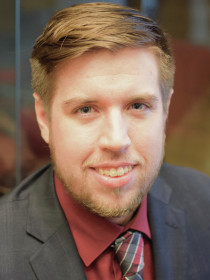
Tyler Hallmark
Connect with Tyler
About Tyler
Hallmark's research focuses on institutional climate and culture and the effects these institutional aspects have on student persistence. Overarching themes in Hallmark's writings include: class and socioeconomic issues in higher education; intersectionality, identity, and inequality on college campuses; and the potential of institutions for the public good. Hallmark serves as an affiliate of various higher education research centers, a consultant for student voter engagement groups, and an advocate for students in need.
Contributions
In the News
Publications
Examines the organization of learning in geoscience fieldwork with implications for inclusion and exclusion of diverse learners. Involves 275 hours of observations and 32 interviews of participants at two separate undergraduate and graduate fieldwork courses in the western United States.
Examines how intersectionality, a lens from the social sciences, can be employed conceptually and practically to broaden participation in geosciences, particularly among underrepresented groups such as women of color or others with multiple marginalized statuses. Outlines the key concepts constituting a lens of intersectionality and explain a specific model of intersectionality that incorporates multiple individual, cultural, and historical layers.
Examines how intersectionality, a lens from the social sciences, can be employed conceptually and practically to broaden participation in geosciences, particularly among underrepresented groups such as women of color or others with multiple marginalized statuses.
Pushes readers to think about MSIs across the world rather than as only residing in a context that is United States-centric.
Serves to highlight MSIs which are overcoming barriers to voting for their students — institutions that serve as role models for turning student activism into votes.
Explores the role that Minority Serving Institutions (MSIs) play in democratizing education in the USA and around the world, examining both the institutions and their larger context.
Discusses the variety of barriers to accessing study abroad for students of color and the opportunities for HBCUs and HSIs to tackle these challenges.
Examines the issues that students and racial and ethnic minorities face getting to the polls and the role that MSIs could play in overcoming these obstacles.